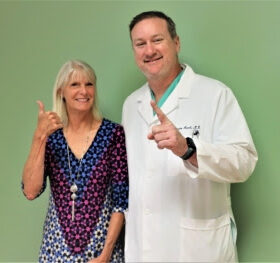
Press Release
Submitted by Kristi Tucker
September 17, 2022
Pamela Jordan, 61, of St. Johns, Florida, a retired dental office manager, wasn’t having any aneurysm symptoms, exercises three days a week and lives a healthy lifestyle. Her sister had been diagnosed and treated for a brain aneurysm by Ricardo Hanel, MD, Ph.D., neurosurgeon and co-medical director of Baptist Stroke & Cerebrovascular Center last year. Her brother had suffered a stroke in the past. So, when her sister asked her to participate in a research study at Baptist Health funded by the state of Florida to assess the hereditary probability of brain aneurysms, she agreed.
“I wasn’t thinking I’d have a problem, but if I can do something to help others, I’m all for it,” Jordan said. “I was surprised when they actually found something!”
As part of the study, participants receive a magnetic resonance angiographic (MRA) scan that provides images of arteries used to evaluate them for abnormalities, such as aneurysms. When Dr. Hanel reviewed Jordan’s MRA, he found a 6 mm unruptured aneurysm behind her right eye—the same location as her sister’s aneurysm. The size and placement and Jordan’s age indicated an elevated risk for rupture.
Jordan was grateful it was found before it burst. “Rather than having an emergency situation with a ruptured aneurysm or stroke, I had a controlled situation with proper treatment,” said Jordan, who is now encouraging her brother and her three adult children to join the study.
Thus, Jordan became the first family member to be treated for an aneurysm found during the study. Dr. Hanel inserted a cylindrical “pipeline” device to slow the flow of blood into the aneurysm and allow the vessel to heal.
A brain aneurysm is a weak spot on a blood vessel in the brain that bulges and fills with blood, like a bubble. Unruptured brain aneurysms often have no symptoms but finding and treating them before they burst is a good stroke prevention measure. A ruptured aneurysm may cause serious health conditions, including stroke, brain damage, coma or death.
The Familial Brain Aneurysm Study is intended to help researchers determine to what extent a family’s history of brain aneurysms can play in determining the likelihood of their occurrence in later generations as well as genetic markers of it. The findings may be used to advance the use of routine screening during medical exams. Study participants are people who have had aneurysms and their first-degree family members.
“Today, we know that if you have two first-degree relatives (mother, father, siblings) with a brain aneurysm, your risk of having an aneurysm increases from 4% to 8%,” said Dr. Hanel, who is the principal investigator of the study. “Discovering Mrs. Jordan’s aneurysm in the course of the study is gratifying because we helped prevent a possible emergency situation, and it’s further evidence that heredity may play a role in predicting the likelihood of aneurysm in a family line.”
Baptist Health first announced the study in September 2021 upon receiving a $250,000 grant from the state of Florida. In April 2022, the state announced an additional $500,000 grant, allowing the health system to recruit more study participants.
Olivia and Phil Hoblit, founders of the Trinity Love Hoblit Foundation for brain aneurysm awareness, helped secure the funding, which was ultimately granted in the State’s budget by Senator Aaron Bean, Representative Wyman Duggan and Representative Clay Yarborough. The Trinity Love Hoblit Foundation annually donates funding for neurological research, training and treatment for brain aneurysms, strokes and other cerebrovascular conditions to the Sty Neuroscience Institute at Wolfson Children’s Hospital and Baptist Neurological Institute.
To date, more than 200 patients and their family members have enrolled in the study. Baptist Health hopes to reach 1,000 participants by June 2023 and is actively recruiting. A patient diagnosed with an intracranial aneurysm and at least one first-degree family member (mother, father, sibling, children) must agree to participate (e.g., it cannot be only the patient or only the family member). There is no limit to the number of first-degree relatives who can be enrolled and screened. Once enrolled, it’s a straightforward process: every participant completes a survey and gives a blood sample. Family members also undergo vessel imaging (MRA) — the patient will already undergo this process during their initial diagnosis. There is no cost to the participants. Contact 904-388-6518, ext: 58762, for more information.
The Trinity Love Hoblit Foundation, based on Amelia Island, was founded by Phil and Olivia Hoblit after their daughter Trinity’s death from a ruptured brain aneurysm two days before she was scheduled for surgery to address the situation. She was 14 years old.

Is the research study still on-going? My two older sisters died of brain aneurysm 3 years apart. I am wondering if the same runs through me. What does it take to participate in the study? Thank you.
Yes it’s ongoing. Check with the hospital for details.
Will you please ask folks to send you pics to post on your site … so many of us are not there and want to get a better idea of the island’s damage.
We did ask for photos and also have people looking around. But so far, thankfully, damage seems to be light. By tomorrow, we’ll know a lot more.